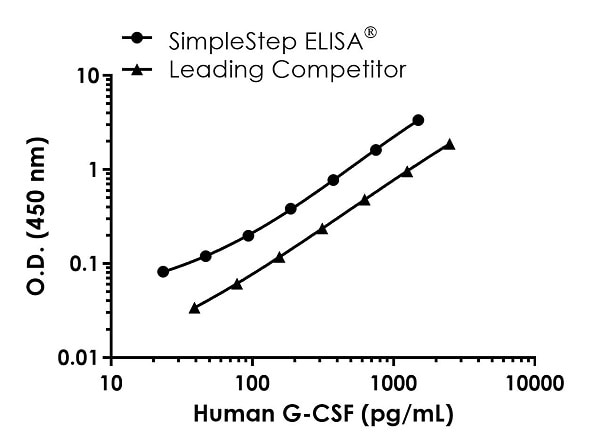Human G-CSF ELISA Kit (ab264627)
Key features and details
- One-wash 90 minute protocol
- Sensitivity: 11 pg/ml
- Range: 23.44 pg/ml - 1500 pg/ml
- Sample type: Cell culture supernatant
- Detection method: Colorimetric
- Assay type: Sandwich (quantitative)
- Reacts with: Human
Overview
-
Product name
Human G-CSF ELISA Kit
See all G-CSF kits -
Detection method
Colorimetric -
Precision
Intra-assay Sample n Mean SD CV% Supernatant 8 3.8% Inter-assay Sample n Mean SD CV% Supernatant 3 4.3% -
Sample type
Cell culture supernatant -
Assay type
Sandwich (quantitative) -
Sensitivity
11 pg/ml -
Range
23.44 pg/ml - 1500 pg/ml -
Recovery
Sample specific recovery Sample type Average % Range Cell culture supernatant 108 104% - 114% -
Assay time
1h 30m -
Assay duration
One step assay -
Species reactivity
Reacts with: Human -
Product overview
Human G-CSF ELISA Kit (ab264627) is a single-wash 90 min sandwich ELISA designed for the quantitative measurement of G-CSF protein in cell culture supernatant. It uses our proprietary SimpleStep ELISA® technology. Quantitate Human G-CSF with 11 pg/ml sensitivity.
SimpleStep ELISA® technology employs capture antibodies conjugated to an affinity tag that is recognized by the monoclonal antibody used to coat our SimpleStep ELISA® plates. This approach to sandwich ELISA allows the formation of the antibody-analyte sandwich complex in a single step, significantly reducing assay time. See the SimpleStep ELISA® protocol summary in the image section for further details. Our SimpleStep ELISA® technology provides several benefits:
- Single-wash protocol reduces assay time to 90 minutes or less
- High sensitivity, specificity and reproducibility from superior antibodies
- Fully validated in biological samples
- 96-wells plate breakable into 12 x 8 wells stripsA 384-well SimpleStep ELISA® microplate (ab203359) is available to use as an alternative to the 96-well microplate provided with SimpleStep ELISA® kits.
-
Notes
Granulocyte Colony Stimulating Factor (G-CSF) is a glycoprotein that stimulates bone marrow to produce and release granulocytes and stem cells into the bloodstream. G-CSF also stimulates the survival, proliferation, differentiation, and function of neutrophil precursors and mature neutrophils. G-CSF regulates neutrophil development using Janus kinase (JAK)/signal transducer and activator of transcription (STAT) and Ras/mitogen-activated protein kinase (MAPK) and phosphatidylinositol 3-kinase (PI3K)/protein kinase B (Akt) signal transduction pathway. Granulocyte Colony Stimulating Factor (G-CSF) is a glycoprotein that stimulates bone marrow to produce and release granulocytes and stem cells into the bloodstream. G-CSF also stimulates the survival, proliferation, differentiation, and function of neutrophil precursors and mature neutrophils. G-CSF regulates neutrophil development using Janus kinase (JAK)/signal transducer and activator of transcription (STAT) and Ras/mitogen-activated protein kinase (MAPK) and phosphatidylinositol 3-kinase (PI3K)/protein kinase B (Akt) signal transduction pathway.
-
Platform
Pre-coated microplate (12 x 8 well strips)
Properties
-
Storage instructions
Store at +4°C. Please refer to protocols. -
Components 1 x 96 tests 10X Human Human G-CSF Capture Antibody 1 x 600µl 10X Human Human G-CSF Detector Antibody 1 x 600µl 10X Wash Buffer PT (ab206977) 1 x 20ml Antibody Diluent 4BI 1 x 6ml Human Human G-CSF Lyophilized Recombinant Protein 2 vials Plate Seals 1 unit Sample Diluent NS (ab193972) 1 x 12ml SimpleStep Pre-Coated 96-Well Microplate (ab206978) 1 unit Stop Solution 1 x 12ml TMB Development Solution 1 x 12ml -
Research areas
-
Function
Granulocyte/macrophage colony-stimulating factors are cytokines that act in hematopoiesis by controlling the production, differentiation, and function of 2 related white cell populations of the blood, the granulocytes and the monocytes-macrophages. This CSF induces granulocytes. -
Sequence similarities
Belongs to the IL-6 superfamily. -
Post-translational
modificationsO-glycan consists of Gal-GalNAc disaccharide which can be modified with up to two sialic acid residues (done in recombinantly expressed G-CSF from CHO cells). -
Cellular localization
Secreted. - Information by UniProt
-
Alternative names
- C17orf33
- Colony stimulating factor 3
- Colony stimulating factor 3 (granulocyte)
see all -
Database links
- Entrez Gene: 1440 Human
- Omim: 138970 Human
- SwissProt: P09919 Human
- Unigene: 2233 Human
Images
-
SimpleStep ELISA technology allows the formation of the antibody-antigen complex in one single step, reducing assay time to 90 minutes. Add samples or standards and antibody mix to wells all at once, incubate, wash, and add your final substrate. See protocol for a detailed step-by-step guide.
-
Standard Curve comparison between human G-CSF SimpleStep ELISA kit and traditional ELISA kit from leading competitor. SimpleStep ELISA kit shows increased sensitivity.
-
Standard Curve comparison between the original human MMP3 SimpleStep ELISA kit (ab188390) and current human MMP3 SimpleStep ELISA kit (ab264627).
-
The G-CSF standard curve was prepared as described in Section 10. Raw data values are shown in the table. Background-subtracted data values (mean +/- SD) are graphed
-
The concentrations of G-CSF were measured in duplicates, interpolated from the G-CSF standard curves and corrected for sample dilution. Undiluted samples are as follows: stimulated PBMC supernatant 100%. The interpolated dilution factor corrected values are plotted (mean +/- SD, n=2). The mean G-CSF concentration was determined to be 354 pg/mL in stimulated PBMC supernatant. Unstimulated PBMC supernatant signal was undetectable.
-
To learn more about the advantages of recombinant antibodies see here.

















